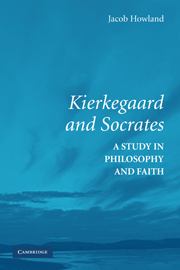Book contents
- Frontmatter
- Contents
- Note on Texts and Translations
- Acknowledgments
- Kierkegaard and Socrates
- Introduction
- 1 Johannes Climacus, Socratic Philosopher
- 2 Climacus's Thought-Project
- 3 Platonic Interlude: Eros and the God
- 4 Climacus's Poetical Venture
- 5 The Paradox and the Passion of Thought
- 6 Self-Love and Offense
- 7 Faith and the Contemporary Follower
- 8 Climacan Interlude: On Historical Necessity
- 9 The Follower at Second Hand and The Moral
- 10 Socrates in Postscript
- Epilogue: Kierkegaard on Christ and Socrates
- Works Cited
- Index
10 - Socrates in Postscript
Published online by Cambridge University Press: 01 December 2009
- Frontmatter
- Contents
- Note on Texts and Translations
- Acknowledgments
- Kierkegaard and Socrates
- Introduction
- 1 Johannes Climacus, Socratic Philosopher
- 2 Climacus's Thought-Project
- 3 Platonic Interlude: Eros and the God
- 4 Climacus's Poetical Venture
- 5 The Paradox and the Passion of Thought
- 6 Self-Love and Offense
- 7 Faith and the Contemporary Follower
- 8 Climacan Interlude: On Historical Necessity
- 9 The Follower at Second Hand and The Moral
- 10 Socrates in Postscript
- Epilogue: Kierkegaard on Christ and Socrates
- Works Cited
- Index
Summary
The epigram that introduces Fragments is a saying that Climacus attributes to Shakespeare: “Better well hanged than ill wed.” Climacus interprets this statement at the very beginning of the Preface of Postscript: “better well hanged than by a hapless marriage to be brought into systematic in-law relationship with the whole world” (5). This explanation serves more than one function, for in adverting to the epigram of Fragments, Climacus indirectly calls attention to that of Postscript – a remark by the sophist Hippias in Plato's Greater Hippias. Hippias complains that Socrates has confronted him with nothing but “scrapings and clippings of speeches” (304a). In the immediate sequel to the quoted passage, Hippias advises Socrates to produce big and beautiful discourses and to refrain from the “little speeches” of philosophical question and answer; in this way, he explains, Socrates will avoid seeming “exceedingly unintelligent” by engaging in “nonsense and babble” (304b). Taken together with the epigram of Fragments, the meaning of the Postscript epigram could hardly be clearer: the proponents of the Hegelian system are sophists or sham-philosophers, and Climacus will extend the Socratic critique of them that he initiated in Fragments.
At the end of Fragments, Climacus mentions his intention to produce another “section” of his “pamphlet,” in which he will “clothe the issue [of Christianity] in its historical costume” (109). This intention is fulfilled in the first part of Postscript, which presents the “promised sequel” to Fragments.
- Type
- Chapter
- Information
- Kierkegaard and SocratesA Study in Philosophy and Faith, pp. 188 - 208Publisher: Cambridge University PressPrint publication year: 2006

